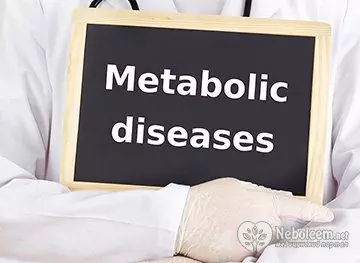- Author Rachel Wainwright wainwright@abchealthonline.com.
- Public 2023-12-15 07:39.
- Last modified 2025-11-02 20:14.
Metabolic disease

In the human body, there is a constant exchange of proteins, fats and carbohydrates. Their synthesis and destruction occur with the participation of various enzymes according to a strictly defined scenario, which is individual for each component.
In case of disruptions in metabolism, many unpleasant diseases develop, therefore, the treatment of metabolic disorders must be timely and qualified.
Causes of metabolic disorders
There are many different prerequisites for metabolic disorders, but not all of them are fully understood. Despite this, a number of factors can be identified that negatively affect metabolic processes.
The first reason for metabolic disorders is malnutrition, which is widespread in modern society. Dangerous as hunger strikes, strict diets and fasting days, and overeating or abundant food once a day.
The second reason for metabolic failures is stress and prolonged nervous tension, because all metabolic processes are regulated precisely at the level of the nervous system.
The next important factor is age, especially in women. Over time (by the end of the childbearing period) the production of female sex hormones stops, and in general this leads to metabolic disorders.
At risk are people who abuse smoking and alcohol, since the harmful substances present in cigarettes and drinking inhibit the functions of the organs of internal secretion.
In addition to the listed causes of metabolic disorders, there are others: genetic predisposition, lack of a daily regimen, severe illnesses, parasitic factor (microorganisms and worms) and much more. However, this does not mean that the failure of metabolic processes is incurable. If you detect the symptoms of the disorder in a timely manner and consult an endocrinologist, you can quickly restore the normal functioning of the body.
Symptoms of metabolic disorders
A metabolic disorder can be identified by the following signs and changes in appearance:
- Tooth decay;
- Rapid weight gain
- Dyspnea;
- Disruption of the gastrointestinal tract (constipation or diarrhea);
- Discoloration of the skin;
- Puffiness;
- Problems with nails and hair.
Many women who have noticed some of the symptoms of metabolic disorders, and in particular overweight, seek to cleanse their body on their own. Doing this is strongly discouraged, since self-medication can only aggravate the situation. Any action in this direction should be preceded by a doctor's consultation.
Why do metabolic malfunctions require specialist supervision? The fact is that such violations affect primarily the processes associated with fat metabolism. The liver cannot handle large amounts of fat, so low-density lipoproteins and cholesterol accumulate in the body. They settle on the walls of blood vessels and cause the development of diseases of the cardiovascular system. Therefore, if you find signs of metabolic disorders, you should immediately consult a doctor.
Diseases associated with metabolic disorders
There are many different metabolic diseases, but the main ones can be presented in the form of the following groups:
- Protein metabolism disorders. Protein starvation leads to diseases such as: kwashiorkor (unbalanced deficiency), alimentary dystrophy (balanced deficiency), bowel disease. With an excessive intake of proteins, the liver and kidneys are affected, neuroses and overexcitation occur, urolithiasis and gout develop;
- Fat metabolism disorders. An excess of this component leads to obesity, and with a lack of fat in the diet, growth slows down, weight loss occurs, the skin becomes dry due to a deficiency of vitamins A and E, cholesterol rises, bleeding appears;
- Disorders of carbohydrate metabolism. The most common endocrine disease in this group is diabetes mellitus, which occurs due to a lack of insulin when carbohydrate metabolism fails;
- Vitamin metabolism disorders. An excess of vitamins or hypervitaminosis has a toxic effect on the body, and hypovitaminosis (deficiency) leads to diseases of the digestive system, constant fatigue, irritability, drowsiness and decreased appetite;
- Mineral metabolism disorders. With a deficiency of minerals, a number of pathologies develop: a lack of iodine leads to diseases of the thyroid gland, fluoride - to the development of caries, calcium - to muscle and bone weakness, potassium - to arrhythmia, iron - to anemia. Diseases of metabolic disorders associated with an excess of minerals in the body are nephritis (a lot of potassium), liver diseases (excess iron), deterioration of the kidneys, blood vessels and heart (with excessive salt intake), etc.
Treatment of metabolic disorders
Treatment of metabolic disorders is a responsible, and sometimes very difficult task. Diseases that are genetically determined require regular therapy and constant monitoring by doctors. Acquired diseases can usually be cured early, but if timely medical intervention is not available, this can lead to serious complications.

The main forces in the treatment of metabolic disorders should be aimed at correcting the diet and diet. It is necessary to limit and control in the future the amount of carbohydrates and fats of animal origin entering the body. Thanks to frequent fractional meals, you can reduce the amount of food taken at a time, and as a result, achieve a decrease in stomach volume and a visible decrease in appetite.
In the process of treating metabolic disorders, it is also necessary to adjust the sleep pattern. The timely suppression of stressful situations and correct recovery after various negative influences on the psyche lead to the normalization of metabolism. We must not forget about physical activity, since moderate sports increases the energy consumption of the body, and this leads to the consumption of fat reserves.
Each of the factors listed above plays a significant role in the treatment of metabolic disorders. But the best results can be achieved with an integrated approach, when timely preventive measures in order to prevent the disease are combined with qualified treatment in the event of an advanced disease.
YouTube video related to the article:
The information is generalized and provided for informational purposes only. At the first sign of illness, see your doctor. Self-medication is hazardous to health!






